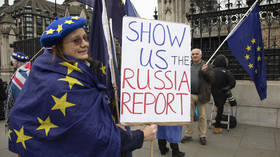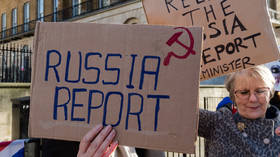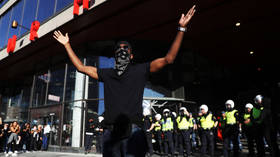Brexit opponents hoped ‘Russia report’ would show Moscow’s interference, but it only showed awful blindness of UK foreign policy

The House of Commons report into Russia demonstrates that the British elites are brain dead.
In his famous 1946 essay, ‘Politics and the English language’, George Orwell argued that lazy cliches are evidence of an inability to think.
I was reminded of this essay when reading the report published on July 21 by the House of Commons ‘Intelligence Committee’. Indeed, the inanity of the report leads me to suggest that their body should be re-named ‘the stupidity committee’.
The report has received much publicity because opponents of Brexit in Britain had hoped it would show Russian interference in the 2016 referendum, the result of which they have been determined to delegitimise and overturn. In reality, the report brushes aside the issue and says nothing about Brexit at all. This has not stopped pro-European anti-democrats like Guy Verhofstadt from claiming that it has proved their case, which it has not.
Brexit was always a gift to Putin because it weakened the European Union & left Britain divided, isolated. The #RussiaReport shows just how many questions remain unanswered.https://t.co/Xob9uYn3w6
— Guy Verhofstadt (@guyverhofstadt) July 21, 2020
Instead, the report proves something else: the incapacity of the British elite to think strategically, or even to think at all. The document is a monument to the terrible blindness of British foreign policy.
For instance, in paragraph 4, entitled ‘What does Russia want?’, the report states that Russian foreign policy is “nihilistic,” a term it does not explain or develop; that it is “fed by paranoia” because Russia believes that NATO and the EU are aggressive; that it seeks to undermine the “rules-based international order”; and that Russia sees foreign policy as a “zero-sum game” in which any actions which damage the West are good for Russia.
All four of these propositions apply more to British and Western foreign policy than they apply to Moscow’s, but London can see only the speck of dust in Russia’s eye and not the beam in its own.
It is not Russian foreign policy which is in the grip of paranoia but the West’s. For years now, so-called dissident views in Europe and America have been attacked as being orchestrated from Moscow. Russiagate dragged on for about four years in the USA but the same allegations are made time and again against European politicians: one of the most recent attacks was against the Dutch politician, Thierry Baudet.
Calling your political opponents members of a fifth column in the pay of a hostile foreign power is what the Stalinist regime did in the late 1930s with its infamous show trials, as it was obsessed with the Trotskyite conspiracy being directed from abroad. The mentality in the West today is the same, where many politicians and commentators sound like Jack D. Ripper in Dr Strangelove.
The West, moreover, specifically sees East-West relations as a zero-sum game, in which Western influence must be increased in order to decrease Russian influence. This is the very accusation the House of Commons report makes against Moscow – but the boot is on the other foot. The logic of the zero-sum game is explicitly applied to Ukraine, Macedonia, Serbia, Montenegro and many other places, where it is said that the West must pursue EU and NATO integration to prevent those countries falling into the Russian orbit.
A very typical example, but only one among thousands, is the article published last week in the American journal, Foreign Policy, entitled ‘Russian and Chinese influence is growing. The EU needs to step up its game to avoid being sidelined’. Indeed paragraph 138 of the House of Commons report, which deals with Syria, explicitly says that Russian influence in Syria has reduced Western influence there. So who thinks in terms of a zero-sum game, Russia or the West?
And what about the accusation that Russia seeks to undermine ‘the rules-based international order’? This cliche is trotted out all the time: it has become a mantra. But you can tell that, as Orwell identified, it covers up a lack of any thought because, in spite of thousands of repetitions, no one who uses this phrase ever says which rules Russia is trying to undermine.
If anyone thought about it, which they do not, they would have to conclude that the rules on which the international order are based are laid out in the Charter of the United Nations. There is no other rule book currently in existence. That Charter contains one big rule and one big mechanism for enforcing it: the rule against aggressive warfare by one state against another. The mechanism for enforcing it is the Security Council.
If we look back over the post-Cold War period, which great powers have broken those rules? The most obvious examples are the Kosovo and Iraq wars (1999 and 2003), waged without Security Council approval, and the attack on Libya in 2011 which, although approved by the Security Council to protect civilians, was in fact a regime change operation and therefore illegal under the terms of the relevant Resolution. Syria is also a case in point where NATO powers, the USA and Turkey, have illegally sent troops into that country, i.e. invaded it.
Throughout all this time, Russia has pleaded with the West to respect the rules and to go through the United Nations. Its appeals have fallen on deaf ears. Instead, the West has said that it wants to rewrite those rules, for instance when Tony Blair unilaterally announced a new ‘Doctrine of the International Community’ during the bombing of Yugoslavia in 1999.
So who, under these circumstances, is trying to change the rules-based order or undermine the existing rules? When I read that dead phrase, I recall Orwell’s judgment: “prose consists less and less of words chosen for the sake of their meaning, and more and more of phrases tacked together like the sections of a prefabricated hen-house.”
The inability to think is at the root of an even deeper blindness about foreign policy in general in a grown-up way. Take the obsessive references in the House of Commons report to the Skripal affair. It mentions this no fewer than 20 times. By contrast, there are only four references to ‘the annexation of Crimea’ or ‘what happened in Crimea’ and no references at all to ‘Ukraine’.
Also on rt.com ‘Russia Report’: Once-mighty British intelligence has been reduced to regurgitating sensationalist Buzzfeed storiesEven if one accepts the official version of the Skripal affair, which I most certainly do not, it is impossible to claim that a botched assassination attempt is more important, in foreign policy terms, than what happened in Ukraine in 2014. Ukraine is indeed a geopolitical pivot between East and West, and the developments there after the Maidan coup are of world-historical significance. But the report treats them as a side issue, thereby vitiating any claim it makes to give an authoritative account of the political conflict between Russia and the West and rendering it useless as a tool of analysis or policy-making.
I have long argued that the real battle in politics today is between intelligence and stupidity – between people who try to analyse reality as it is, in all its contradictions and nuances, and people who prefer to simplify everything in order to have the intoxicating pleasure of making accusations against others. This report confirms that the House of Commons is emphatically on the side of stupidity. I leave it to the reader to decide which side Russia is on.
Think your friends would be interested? Share this story!
The statements, views and opinions expressed in this column are solely those of the author and do not necessarily represent those of RT.















